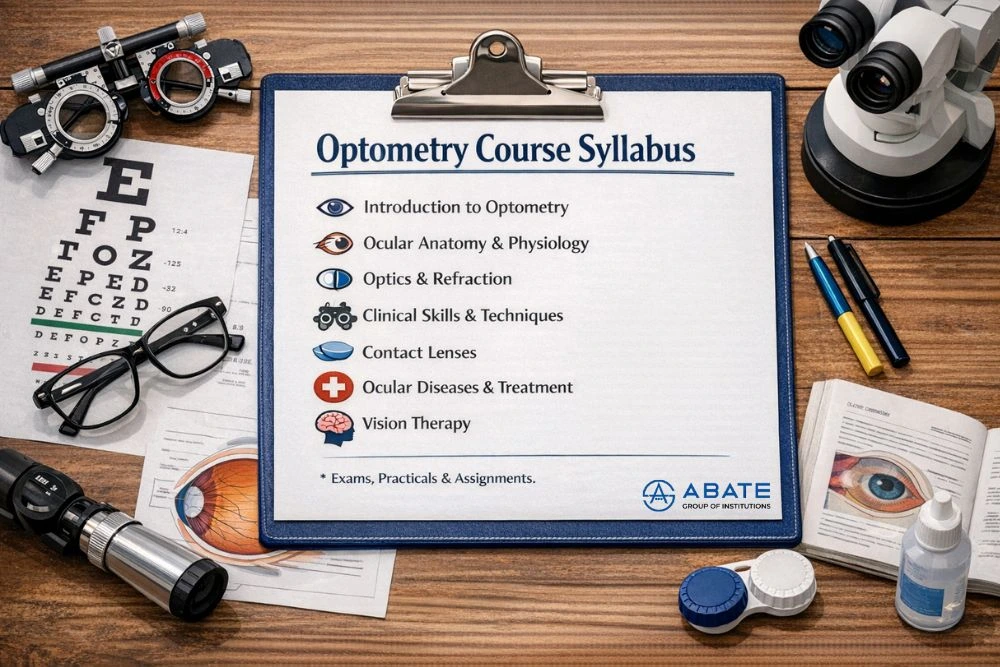The Growing Scope of Optometry: A Promising Career in Vision Care

Optometry, the science of eye care and visual health, has emerged as one of the most promising fields in the healthcare sector. With increasing awareness of vision problems, lifestyle changes, and the rise in digital screen usage, the demand for qualified optometrists is growing rapidly. Knowing the scope of optometry will help you make an informed choice if you're thinking about a career in eye care.
What is Optometry?
The diagnosis, treatment, and prevention of eye conditions and visual issues are the focus of the specialist medical field of optometry. An optometrist is trained to conduct vision tests, prescribe corrective lenses, detect eye conditions, and offer rehabilitation for low vision. In clinical settings, they also collaborate closely with ophthalmologists to offer complete eye care.
Why Optometry is a Career with a Future
The field of optometry is expanding across the globe, with new opportunities emerging in both urban and rural regions. Several factors contribute to this growth:
1. Rising Demand for Eye Care Services
The increased use of digital devices and longer screen exposure have led to a significant rise in vision-related issues. Conditions like computer vision syndrome, myopia, and dry eyes are now common across all age groups. Optometrists play a crucial role in managing and preventing these conditions.
2. Aging Population
As the global population ages, vision problems such as cataracts, glaucoma, and macular degeneration become more prevalent. This trend fuels the need for professional optometrists who can provide regular eye exams and ongoing care for age-related eye conditions.
3. Shortage of Trained Professionals
Due to a lack of trained optometrists in many areas, recent graduates have an easier time making a name for themselves in the industry. Whether you choose to work in hospitals, private clinics, optical stores, or academic institutions, the scope of employment is broad.
Career Opportunities After Optometry
A degree in optometry opens up various career paths, allowing professionals to work in clinical, commercial, research, and academic settings. Here are some common roles:
- Clinical Optometrist: Work in eye hospitals or clinics to examine and treat patients.
- Vision Therapist: Help patients with visual processing disorders, especially children.
- Optical Consultant: Provide advice on lens types and frames at optical outlets.
- Researcher: Conduct studies on eye diseases, treatments, and visual technology.
- Academician: Teach and train future optometrists at colleges and universities.
- Entrepreneur: Start your own eye care clinic in Kerala/ Abroad or optical business.
Global Opportunities in Optometry
The scope of optometry is not limited to India; countries like the USA, UK, Canada, Australia, and Gulf nations actively recruit skilled optometrists. With a recognized degree and clinical experience, you can explore international job roles and even pursue further specialization abroad.
Specializations in Optometry
To further enhance career prospects, optometrists can specialize in areas such as:
- Pediatric Optometry
- Low Vision Rehabilitation
- Contact Lens Practice
- Ocular Disease Management
- Sports Vision
- Geriatric Eye Care
These specializations allow you to focus on niche areas, making you more competitive and valuable in the job market.
Why Choose Abate for Your Optometry Career?
You can choose optometry course in Kerala at Abate. At Abate Group of Institutions, the Optometry program is designed to blend academic excellence with real-world clinical exposure. Offering a 4+1 year structure (B.Sc in Optometry + Doctor of Optometry), the course equips students with comprehensive skills in eye examination, diagnosis, and vision care. With hands-on training at Abate Eye Hospitals and expert mentorship, students gain practical experience that prepares them for diverse careers in hospitals, clinics, research, and global healthcare sectors. Abate's industry-aligned curriculum ensures graduates are ready to meet the growing demand for optometrists both in India and abroad.
The Future of Optometry in India
In India, the need for qualified optometrists is projected to grow steadily. With initiatives promoting preventive eye care and expansion of healthcare services to rural areas, the profession is gaining more importance. Colleges and institutions across India are offering advanced optometry programs with strong clinical exposure, further enhancing the scope for new entrants in the field.
Why Optometry is a Smart Career Choice
Optometry is a rewarding and impactful profession that combines science, healthcare, and technology. With its expanding scope in India and abroad, a career in optometry ensures stability, growth, and the satisfaction of improving people’s lives through better vision. If you're passionate about eye care and looking for a career that offers both personal and professional growth, optometry could be your ideal path.


